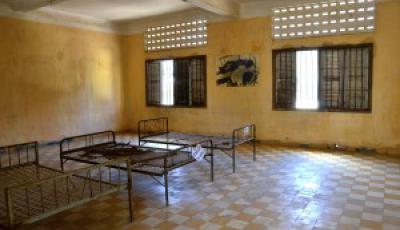From the Field: The Challenges of Conducting Research with Victims of Mass Atrocities
Posted:
Time to read:
Today's guest post is by Rudina Jasini, a doctoral student pursuing research on the participation of victims of gross violations of human rights as civil parties in international criminal proceedings. She recently embarked on a six-month consultancy project with Impunity Watch in Cambodia. This project offered her an opportunity to build upon her doctoral research, by carrying out interviews with civil parties and victim complainants in trials before the Extraordinary Chambers in the Courts of Cambodia (ECCC).
Conducting fieldwork research in the context of post conflict societies ravaged by war and poverty always presents a set of complex challenges. Such a task becomes even more daunting when the focus of empirical research is on the victims of gross violations of human rights. This was particularly prevalent during my most recent research in Cambodia, a country that experienced a systematic campaign of murder and starvation that eradicated over 1.7 million ethnic and non-ethnic Cambodians, during one of the most horrendous mass executions of humanity in modern history.

Before embarking on this project, I sought to prepare myself by asking a number of questions:
- What is different about interviewing victims and survivors of violence and tragedy from other interviews I had conducted with legal practitioners in the past?
- What are the special techniques and ethical obligations in these types of interviews?
- How can I avoid re-victimising already-traumatised individuals?
- How is that fine balance to be struck between obtaining high-quality information from the interviews and limiting the inherent risks involved in trying to obtain that data?
I also familiarised myself with the unique matrix of factors dominating Cambodia’s transitional society. In the quest for justice, Cambodia faces challenges in how much of the slaughter to acknowledge, how to treat the perpetrators, how to address the rights and needs of victims of crimes under the Khmer Rouge regime, and how to recover from the past. These key socio-cultural and legal-political challenges as well as the religious dimension in the country were essential in designing and conducting interviews with victims.
Some of the difficulties I faced as a researcher were related: I had to strive for a delicate approach while staying firm about the need to ascertain clear facts, all the while aware and mindful of victims’ needs and rights. It was important at the very outset to define how victims would be identified in word or image, and crucially, to obtain their consent to any such identification. I also had to explain the objectives of the interview and to prepare the victim for what lay ahead. Adopting an informal style of interviewing granted victims more control over the story process, allowing them to tell their stories. It also enabled me to empathise and search for common emotional ground.
Reflecting the dominant religious beliefs of most Cambodians, victims usually elected to be interviewed in a pagoda. This meant that at the start of each group interview I brought food to share with the victims, but also with Buddha, thus displaying respect for, and the dignity of, religious sentiment in Cambodian society.
The poor infrastructure and the extreme poverty of Cambodia were always going to have a considerable impact on the accessibility of victims as well as the quality of interviews. In this context, I found it helpful to liaise with local agencies and individuals to obtain the most relevant information particularly with regard to infrastructure.

Despite all these challenges, my experience reinforced my fundamental determination to bring to light victims’ perceptions and attitudes regarding their participation in proceedings before the Extraordinary Chambers in the Court of Cambodia (ECCC); their understanding of how victim participation has helped Cambodian victims obtain justice from within, to seek truth, obtain reparations and foster reconciliation through participation. My research is dedicated to the civil parties and victims who shared their stories of pain and loss as well as dignity and resilience in the face of such adversity. Their views and insights on the participation of victims as civil parties at the ECCC have informed the analysis and contributed to a better understanding of the role and scope of victim participation at the ECCC as well as the wider role of active victim participation in transitional justice mechanisms.
Any comments about this post? Get in touch with us! Send us an email, or post a comment here or on Facebook. You can also tweet us.
__________
How to cite this blog post (Harvard style):
Jasini R. (2015) From the Field: The Challenges of Conducting Research with Victims of Mass Atrocities. Available at: http://bordercriminologies.law.ox.ac.uk/from-the-field-the-challenges-of-conducting-research-with-victims-of-mass-atrocities/ (Accessed [date]).
Share:








